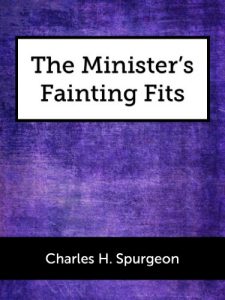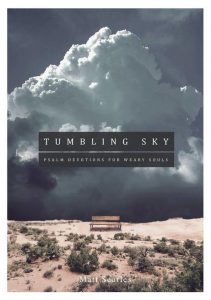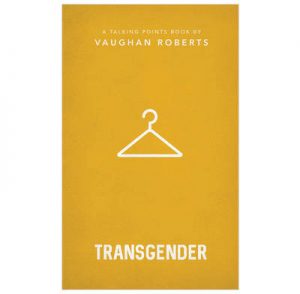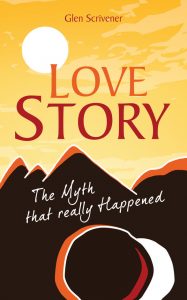Proclaimer Blog
We Need You…

The Proclamation Trust has an urgent need for a receptionist to come and work in our busy central London office on Borough High Street, you will be the first point of contact for most enquiries – this is an exciting opportunity to join our team.
If you know anyone who could help us please pass on the details below.
The post is available immediately. For full details please visit, www.proctrust.org.uk/receptionist
The post is a maternity cover contract offered for a fixed term of 6 months.
It is a genuine occupational requirement that the office holder be in sympathy with the aims and beliefs of The Proclamation Trust.
The salary is £26,500.
Please send a CV and covering letter to pt@proctrust.org.uk ASAP.
Proclaimer Blog
Wednesday is for Women’s Ministry (Part 1)

Carrie Sandom is the Director of Women’s Ministry at The Proclamation Trust. I asked her a few questions about Women’s Ministry.
Here is part 1 of our 4 part series, Wednesday is for Women’s Ministry.
What is Women’s Ministry?
We’re aiming at the same things as men’s ministry – namely to proclaim Christ so women come to accept Him as Saviour and Lord and then to grow in their faith so they become spiritual mature. The Bible needs to be at the centre of all this – so women’s ministry is Word-filled ministry and not topic based! We want God’s Word to set the agenda and not bring our agenda to God’s Word.
What was your journey into women’s ministry?
I was converted as a teenager through the ministry of a good Bible teaching church, I went to uni and then trained as a Maths teacher. I was teaching in a secondary school in Cambridge, running the school CU and teaching 8-11s at my local church on a Sunday morning. The senior minister encouraged me to think about going to Bible College because he reckoned I enjoyed teaching the Bible as much as Algebra.

It took me 4 years to be persuaded that getting some theological training would be a good thing but I went to college thinking I would return to teaching afterwards. The Lord had other plans and I’ve been teaching women in local churches for the last 25 years.
Give us a flavour of what your week looks like at St. John’s Tunbridge Wells in your Women’s Ministry role.
I meet with women’s Bible study group leaders for a prep session every week so we’ve all had a chance to look at the passage that we will be teaching our groups the following week. We’re currently studying the second half of Mark’s gospel.

I’m also meeting up with a new Christian to read the Bible one to one and a non-Christian mum who did the Life Explored course last term and wanted to carry on meeting. We usually have a couple of women’s events each term – one for “in-reach” to build up Christians and one for “out-reach” for them to bring their non-Christian friends to, so I’m also preparing an evangelistic talk on the wide and narrow gates from Mathew 7 – after I’m hoping to run Christianity Explored with one of the mums so that she can run it with someone else next time. I’m also responsible for our senior members programme and enjoy meeting with them on Monday afternoons for some prayers, a Bible talk or testimony, with time to chat over tea and cake.
The Women in Ministry Conference run by PT has grown significantly over the last decade. Give us a flavour of what this conference looks like and seeks to do and how you would like to see it develop further in the coming years.
This conference is for any women who have a regular Bible teaching role – whether full time, part time or in their spare time, whether they are on the staff or not, or paid or not! The women who come are involved in a range of different ministries – women’s ministry, international ministry, student ministry, schools ministry, youth ministry, children’s ministry and ministry to the elderly. What we all have in common is a love for the Lord Jesus and a desire to teach the Bible faithfully.
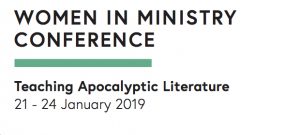
Each year we look at a different Biblical genre and have expositions on that genre from a couple of experienced Bible teachers (usually one man and one woman), workshop groups where we all teach a short passage on that genre to each other and then get constructive feedback from each other and a choice of seminar streams. But outside of the main sessions there are loads of opportunities to talk and share and pray together.
The friendships I’ve developed with people who are in similar ministry contexts to me have been hugely important over the years and the conference provides a way of deepening those friendships as well as making new ones. It’s not all work however and we laugh a lot, particularly over meal times where we get to enjoy someone else’s cooking for a change and don’t even have to do the washing up!
The 2019 Women in Ministry Conference is 21st-24th January at Hothorpe Hall, near Market Harborough. The subject is Apocalyptic Literature and the main speakers are Nigel Styles and Andrea Trevenna.
Proclaimer Blog
Preachers Profile: Melvin Tinker
This is the third in our Preachers Profile Series. This time we asked Melvin Tinker questions about his life and preaching ministry.

 Melvin is the vicar of St. John, Newland in Hull. He has been the vicar there for 23 years. Melvin is married to Heather and they have three grow up sons and nine grandchildren. Melvin enjoys walking and films. Melvin has also authored a number of books.
Melvin is the vicar of St. John, Newland in Hull. He has been the vicar there for 23 years. Melvin is married to Heather and they have three grow up sons and nine grandchildren. Melvin enjoys walking and films. Melvin has also authored a number of books.
We asked Melvin about life and ministry.
When did you preach your first sermon and how long have you been preaching?
When I was a student of 18 (44 years ago!!!) at an evangelistic event held by the CU.
What was your journey to preaching ministry?
Mainly while at university I was given opportunities to preach which began to create within me a desire to serve God in this way. After a short career in teaching, I went to train for the ordained ministry. I certainly would say that the work of PT in the 1980’s under Dick Lucas had a very significant effect in shaping my preaching (for the better I hope!).
Describe the congregation/setting you regularly preach to.
St Johns is a large multi-cultural congregation. It is made up of people from all ages, all walks of life, social groupings and different nationalities. It is the most mixed congregation I know. I minister in the most unchurched city in the UK (less than 0.7%).

What are you currently preaching on/through?
In the mornings a series on John’s Gospel; in the evenings The Apostle’s Creed- the beliefs dealt with expositionally by looking at a particular passage which deals with the article of faith.
What is your regular rhythm of sermon preparation, your usual process and how you schedule it in during the week?
I am usually thinking and praying ahead on the passage to be preached in a week or two’s time, mulling the passage over, thinking of relevant material. Then down to work usually Tuesday morning and using most mornings for preparation (that is when I work best). I will look at the passage and different translations; make notes regarding important features, maybe an outline will be developed as a go through the passage. I will then consult commentaries. Once the main substance of the sermon has been forged I will then note useful illustrations, references and how the text is to engage the congregation- always having a picture of the congregation in my mind as I prepare.
What is your drafting/editing process that you go through in finalising your sermon for Sunday?
Once the sermon has been drafted (I use full text) I then edit, mainly trying to cut it down to a manageable size, noting how to deliver different parts of the sermon, what effect I hope it will have on the hearers. I am keen to ensure that engagement/application takes place throughout the sermon. I give a fair amount of time in crafting a good introduction and conclusion.

What script/notes do you take into the pulpit?
I use full script. This is crucial to ensure that everything that needs to be said is said, there is discipline in delivery (avoiding waffle and going off point)-but I ensure that I am very familiar with the sermon, it is preached, not read.
What is your routine before preaching on a Sunday?
If I am preaching in the morning then before breakfast I go through the sermon, making last minute alterations and spend time in prayer.
What feedback structures do you utilise in improving on your preaching?
There are no formal structures. My wife remains my best critic and friend. But I have other staff members who are willing to give feedback, and we occasionally carve out time to do this in staff meetings of the ministers.
What areas are you currently seeking to develop in your preaching?
Nothing in particular. I am continually challenged and inspired by the preaching of my colleagues – we hold each other to a high standard.
What do you do on the days your preaching did not go very well?
Reading Spurgeon’s talk ‘The Preachers fainting fits’ is good – prayer, reflection and a determination to do better next time by God’s grace.
What one piece of advice would you pass on to someone starting out as a preacher?
Avoid trying to cover too much in one sermon; walk before you can run, work within your limits. Be yourself and don’t try to imitate others (but do emulate good preachers).
What are some of the best resources you have found on preaching?
Lloyd Jones ‘Preaching and Preachers’; Spurgeon’s ‘Lectures to my students’; Stott ‘I Believe in preaching’; Piper, ‘The Sovereignty of God in Preaching’.
Proclaimer Blog
Tumbling Sky – [Matt Searles]
This short new devotional book on the Psalms from Matt Searles is wonderfully honest, biblically potent and deeply pastoral.
It is not triumphalist superficiality to ‘propel’ you into your day, but 34 devotions rooted in reality where the full gambit of human experience is acknowledged. These devotions constantly nudge the reader to take a wider, longer view of present trials in light of the sovereign and faithful God revealed in his Word.
There is an accompanying album which ponders and portrays similar themes. The two together make for a very enriching devotional experience.
The real strength of the book is the pace at which Matt guides the reader gently through the verses in question. It is meticulous without being monotonous, incisive without being exhaustive. In an age where so much devotional material is about breadth, covering great chunks of material in as few sittings as possible, the relaxed and reflective style in Tumbling Sky is deeply refreshing to the soul.
There is also the advantage of each devotion having one resonant and overarching idea that sticks and reverberates throughout the day. These daily devotions are digestible, a couple of pages each (including the text) meaning that people in the depths of the experiences described are given every chance of benefiting from their counsel. There is also an incremental ascent in these devotions, almost imperceptible at the beginning but by devotion 34 you look back as on a mountain trek and marvel at how far you have come as you peer back to the valley below.

Particular highlights for me were the 4 devotions in Psalm 13 and the 3 devotions in Psalm 46. This book made me pause for thought and ruminate on the richness and realness of the language.
I would definitely recommend this book to someone who had grown a bit stale in their devotional life, it is a different kind of devotion to most, slow and saturated.It is also particularly pertinent to people in the midst of trials, struggles, doubts and despair. It is very real and pastorally very sensitive and helpful.
 I think Matt through experience has written a real gem in this beautiful little volume.
I think Matt through experience has written a real gem in this beautiful little volume.
Useful for: Anyone who wants a refreshingly honest devotional. Particularly those struggling (a great present).
Reading level: Very accessible and easy to read.
Price: RRP £7.99
ISBN: 9781911272861
Publisher: 10Publishing
Rating: *****
Proclaimer Blog
The adventures of Carrie Sandom [PT Director of Women’s Ministry]
From 8-13 Nov Carrie Sandom (Director of Women’s Ministry) will be in Dubai leading a Workshop on Biblical Exposition (WBE) in partnership with the Charles Simeon Trust.
Women from 20+ different countries who are living/working in the UAE will be attending the workshop on Titus that is being hosted by John and Keri Folmar of the International Christian Church (ICC) in Dubai.

The key components of the of the conference are sessions on Principles of Exposition, model expositions from the leadership team and practical workshops. Each delegate has been asked to prepare a short talk on a passage from Titus and during the four day conference will present it to their small group. The leaders of each group will then give them feedback so everyone can learn how to better handle God’s Word.

This tried and tested formula has been the bedrock of PT conferences for many years and Carrie’s leadership of the Women in Ministry conference (22-25 Jan 2018) provides women in the UK who are regularly teaching the Bible (whether to women, students, youth or children) with a similar training opportunity.
The Charles Simen Trust have been running WBEs for regular and occasional preachers in the UAE for some years and this is now the second workshop for women. Many of the ex-pats are only there for 3-5 years and will then move on to major cities all over the world. We hope the Bible handling skills the women develop and hone on this conference will equip them for ministry with women in small groups and 1-1s for years to come.

Please pray for Carrie as she travels and serves in Dubai. Pray for great fellowship, real sharpening and much fruit from this key conference.
Proclaimer Blog
Preacher’s Profile: Paul Rees
This is the second post in our Preacher’s Profile Series. This time we asked Paul Rees questions about his life and preaching ministry.
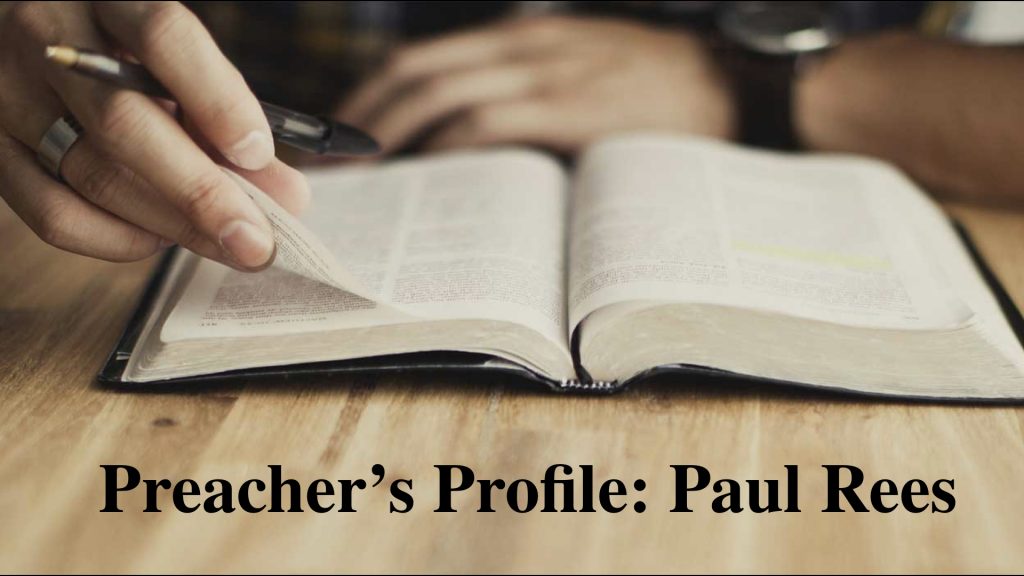
 Paul is the Lead Pastor of Charlotte Chapel in the city centre of Edinburgh. Paul is marries to Shiona and they have four children (3 at Uni and 1 at High School.
Paul is the Lead Pastor of Charlotte Chapel in the city centre of Edinburgh. Paul is marries to Shiona and they have four children (3 at Uni and 1 at High School.
We asked Paul some questions about his life and preaching ministry.
When did you preach your first sermon and how long have you been preaching?
1991 in Dundee – Halfway through preaching the sermon I realised as I preached that I did not really understand the Bible passage I was preaching on. Some kind older people still said it was nice to see a young man in the pulpit.
What was your journey to preaching ministry?
Hearing consistent expository preaching as a student whilst attending St Helen’s Bishopsgate, London 1986-1990.
Being asked to preach in Brethren churches.
Studying at Cornhill Course, London 1993-1994
Working part time as a dentist, self-financing ministry in my home church; during which several churches invited me to work for them full time.
Studying at Moore Theological College, Sydney. Working in student ministry with Simon Manchester (North Sydney) and John Chapman/David Mansfield (department of evangelism).
Describe the congregation/setting you regularly preach to.
Charlotte Chapel -is a gathered city centre church affiliated with the FIEC. Founded in 1808. A multi-generational church with a strong student and international’s ministry.

What are you currently preaching on/through?
About to start a series on the book of Hebrews – helped by attending the Spring Ministers Conference with Doug Moo on the book.

What is your regular rhythm of sermon preparation, your usual process and how you schedule it in during the week?
Monday – day off.
Tuesday – am – Pray & start text work.
Wednesday -am Pray and commentaries
Thursday – Pray & sermon outline am
Friday – pray & write sermon – all day; and sometimes Saturday if prep has not gone well.
Sunday AM – some reshaping if fresh ideas have come, pray & preach.
What is your drafting/editing process that you go through in finalising your sermon for Sunday?
It’s never finished – but just need to get up and preach what you have got; a better outline sometimes comes to mind the Monday afterwards!
What script/notes do you take into the pulpit?
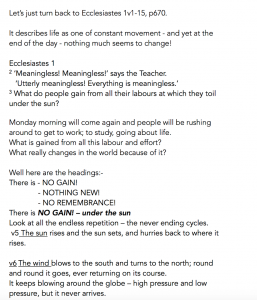
What feedback structures do you utilise in improving on your preaching?
Staff feedback time Tuesday afternoon staff time – was the bible understood correctly; what was helpful; what could be improved.
What areas are you currently seeking to develop in your preaching?
Starting earlier – in order to feel less anxious as the Sunday deadline approaches.
What do you do on the days your preaching did not go very well?
Same as when it seems to go well – spend Monday with my wife Shiona; walking the dog, going for a cycle, relaxing.

What one piece of advice would you pass on to someone starting out as a preacher?
Be a faithful herald of what God says in his Word and then its not about you. Spend time listening to your congregation and with young Christians and prepare so as to apply and be a blessing to them.
What are some of the best resources you have found on preaching?
I think my year at Cornhill – gave me tools and an approach that has largely shaped my preaching and then having older preachers mentor you and give you honest feedback is a great help.
Finding a good commentary on the bible book you are preaching through is a massive blessing.
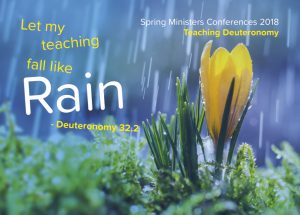
Doug Moo spoke on Hebrews at our Spring Ministers Conferences in 2017.
This year we have Garry Millar speaking on Deuteronomy.
Senior Ministers 23-26 April
Younger Ministers 30 April – 3rd May
Proclaimer Blog
Cross Cultural Preaching Training Day Report [John Miller]
Benin, Cuba, India, Kenya, Malaysia, Myanmar, Nepal, Romania, South Africa, South Korea, Togo. Just a few of the nations visited by those who gathered for the PT Cross Cultural Preaching Training in October. It was a wonderful day meeting with brothers who shared a concern to see expository preaching develop and flourish around the world.

We were envisioned from Isaiah 19 and God’s global gospel goal – his guaranteed plan to gather the nations to worship Him for eternity, even from those who might seem least likely to do so. We were humbled as we considered the character needed for cross-cultural preaching training and the importance of humility, integrity, servant-hearted flexibility and patience.

We were reminded of key convictions about expository preaching and the nature of training preachers. We were helped by Neil Watkinson generously sharing masses of resources and his experience in running training courses, thinking through the content and style of such training. We were equipped in thinking about the cultural differences we might face and how best to consider and speak into those different cultures. We were encouraged as we talked with each other over food about different experiences we had faced in different settings. We were strengthened as we prayed together, depending on our Father for help in this ministry.
A super day that was hugely encouraging and stimulating, both for those who were new to teaching overseas and for those who have done so for years.
Many thanks to Neil Watkinson and the PT team for laying on the day.
Proclaimer Blog
Transgender – [Vaughan Roberts]
This is a very short book (67 pages) and aims to “give you an accessible introduction to the many questions that surround the transgender issue, as we hold our questions up to the big story of the Bible: the story of creation, fall, redemption, and glorification.” It is written for Christians and is highly accessible and readable.
The book is essentially structured into three parts.
The first two chapters deal with what ‘transgender’ is, the problems people who have gender dysphoria face, and how our culture responds to it. It has useful facts, figures and the outcomes of studies. Roberts was careful to express love and sympathy to the LGTBI community and encourage people not to judge. He is also very careful to say that having these sorts of feelings are not a sin in themselves. These chapters also tackle the swift move of our culture to being completely about the individual. It discusses how we are pushed to just ‘be ourselves’ and ‘define our own identity’. In light of this the reaction of our culture will always be ‘yes!’ to people who want to be their ‘true selves’, such as people who have gender dysphoria.
The second part of the book (chapters 3-5) is an overview of the bible. It explains creation, the Fall and then rescue by Jesus with passing references to gender dysphoria and same sex attraction. This is the majority of the book. It is right and vital for us to use the Gospel as a way of explaining and shining truth on every difficult issue.
The final part is the last chapter, titled ‘Wisdom’. I thought this chapter was the best and I would have loved more, it was very brief. It is about how to apply the bible overview to specific situations lovingly and without putting people who are transgender in their own special category.
There were some parts of the book that I was not totally at ease with. I thought the binary response of Yuck or Yes to transgenderism was slightly insensitive. I also longed for some wisdom about how churches could set about loving and serving people in their turmoil would have been helpful.
Overall, if you know very little about the topic and would like a brief introduction that is sound and biblical this is the book for you. These 67 pages are a wonderful introduction and an excellent starter on what is a complex topic that we need all the help we can get to understand and respond wisely to.
Useful for: Anyone who wants an introduction to this complex topic.
Reading level: Very accessible and easy to read.
Price: RRP £2.99
ISBN: 9781784981952
Publisher: The Good Book Company
Rating: *****
Proclaimer Blog
Love Story – [Glen Scrivener]
Love Story – The Myth that really happened – Glen Scrivener (reviewed by R. Brown on 9/10/17)
This short accessible book presents the Easter Story as a ‘True Love Story’ or ‘The Myth that really happened.’ It addresses the secular view that the bible story is a myth and seeks to dispel this and defend the bible account as true. Scrivener does this by showing that whilst the Easter Story has all the ingredients of a great fairy tale, it is in fact not myth but truth that centres around Jesus Christ as the historical hero.
It may have been written with the sceptic in mind but it is also a book that helps the believer think more carefully about using true-story-telling to resonate with the world, something increasingly potent in todays world.
Scrivener begins with the backstory to Easter. He draws clear reference to love being the thread from the beginning, in the very nature of the triune God. He continues the love story theme in each chapter walking the reader through Love Stoops – Jesus washing his disciples feet | Love Suffers – Jesus in Gethsemane | Love Sacrifices – Jesus’ crucifixion | Love Stands – Jesus’ resurrection.
At each stage Scrivener engages the reader with great storytelling and illustrations from ordinary life. He has a masterful way of succinctly and clearly explaining details of the gospel writers accounts, whilst keeping the flow and colour of the story. Whilst using several gospel accounts, there is good contextual faithfulness in the handling of these. This facilitates resonance with the reader that leads to a call to respond to the unfolding truths.
I am not in the sceptic camp but this is certainly a book that I would put into the hands of a sceptic and encourage them to read. It also gave me a fresh joy in the Easter story and may prove to be an encouragement to the believer who is struggling with doubt. Definitely one I would recommend.
Useful for: An Easter give away at an evangelistic service or to put into the hands of the congregation to give away to others.
Reading level: Very accessible and easy to read, a good evangelistic resource.
Price: RRP £4.99, (drops to £1 each for bulk buy from 10ofthose)
ISBN: 9781784981204
Publisher: 10ofthose
Rating: ****
Reviewed by R. Brown
Proclaimer Blog
Preacher’s Profile: Chris Green
This is a new series we are running on the Proclaimer Blog. We are asking different preachers questions about their life and ministry:

 Chris Green is the vicar of St. James, Muswell Hill in North London, he is married to Sharon, and they have two teenage boys. Outside of pastoral ministry Chris enjoys reading, painting, learning to sail, and pretty much anything that London throws at him culture-wise! Cricket, yes, rugby, yes, football, yawn…
Chris Green is the vicar of St. James, Muswell Hill in North London, he is married to Sharon, and they have two teenage boys. Outside of pastoral ministry Chris enjoys reading, painting, learning to sail, and pretty much anything that London throws at him culture-wise! Cricket, yes, rugby, yes, football, yawn…
Chris blogs at ministrynutsandbolts.com
We asked Chris some questions about his preaching ministry.
When did you preach your first sermon and how long have you been preaching?
My first sermon would have been in 1981, and I’m tempted to say I was two at the time, but I was a recent graduate in Edinburgh, and spending time being what we would now call an intern at the church I’d gone to as a student, St Thomas’, Corstorphine.
I don’t remember the passage, but I do remember the feedback: “Well, you’re no Spurgeon…”
What was your journey to preaching ministry?
I was keen on expository preaching even then. As an undergrad I made a habit of buying the ‘Bible Speaks Today’ commentary series as they came out, and working through them in my Quiet Times, they shaped my expectations and habits early on.
I was also involved in summer youth camps with Andrew Cornes, who was then at All Souls in London, and he drilled us in faithful exegesis and careful application. Constructing 12-minute talks under his supervision, and with his laser-like feedback, was formative.
Training for ordination in Durham, a bunch of us formed an informal preaching group to present and critique each other, which was a novel idea in those days. One of the members of that group introduced me to The Proclamation Trust, in its very, very early days. The preaching conferences at Fairmile Court with Dick Lucas were glorious, though I remember seeing quite senior people hiding in a corner so that Dick wouldn’t pounce on them to give their sermon for critique! A few years later I joined Dick as his study assistant, to write a book and help found the Cornhill Training Course – and since then I’ve been preaching, training and writing almost continually.
Describe the congregation/setting you regularly preach to.
St James is a largeish church, and we have four congregations. The 8.00 is a traditional Prayer Book service, and we follow Cranmer’s lectionary. We tend to give two the main morning congregations one series, and the evening a separate one, although a couple of times a year we line up all three, together with the small groups and some private reading, and focus on one thing.

Most recently we did a focus on the Lord’s Prayer like that, and published our own prayer journal to go with it. Our mornings tend to attract the families, the evening is younger and livelier, but with hardly any students. The arts are a big deal round here, so we put a high value on music and the way we present things. North London is vibrant and multicultural, and we are all that, but our part of town is affluent liberal, and that’s our ambient setting and constant temptation. So as preachers, we aim to be preaching about an attractive counter-culture.
What are you currently preaching on/through?
In the morning we have just finished a series in Ephesians, and we are back in our default gospel, which is Matthew, where we are in chapter 11.
In the evening we are doing the life of David, and our young adults ministry is looking at some of the Psalms, in parallel.
What is your regular rhythm of sermon preparation, your usual process and how you schedule it in during the week?
This keeps changing, but I have to try to keep the first part of it under control because there is no end to commentaries. If I’m not careful I spend too much time with them, and not enough time thinking, praying and processing for myself.
So two hours on Monday is given to starting with the Greek or Hebrew, sentence flow diagrams, and working through the most fruitful commentaries, with another two hours on Tuesday. Wednesday, another two hours, but by this point I’m playing with ideas, structure (actually, I prefer to think of ‘plot’), and application. The sheets of A4 look very messy at this stage, because I’m trying out ideas.
The ‘two hours’ rule is arbitrary but useful for me: I rarely find that a third hour on the trot is anywhere near as useful as the first two, so I just stop. The pressure means I focus, and it creates more time for the imaginative, creative task. Thursday is when it all comes together, and my aim is that by Thursday lunchtime the sermon should all have come together. Key ideas, phrases, the main stress, are all clear and – ideally – if the roof caved in and I couldn’t do another thing, I could still preach it.
Friday is a day off, so Saturday is when I can spend a couple of hours getting it into a ‘preachable’ format. I encourage the team to practice their sermons in situ, to get an idea of how they will ‘sound’ rather than read, and I’m very happy to receive feedback straight after the first service, in case I need to tweak it for the second. ‘Anything I need to change?’ is a routine question for us. I can’t afford to be precious with the material.
What script/notes do you take into the pulpit?
I’ve tried all sorts of notes, and none, over the years, and I’ve come back to a moderately full set of notes, in a Moleskine. (Actually, to be really geeky, my preferred notebook is a Leuchtturm1917, which is a tad bigger than a Moleskine).
I used to produce a full manuscript, which certainly helped me to think clearly, but it made me distant and not look at people. If I only have to preach once, I’m happy with going from my memory of the plot (I’m not that precious about my exact wording). But preaching the same sermon two of three times has made me come back to a written format, although I have sections where I’ll know I don’t need notes and can move away from them to communicate more directly, and those are marked up too.
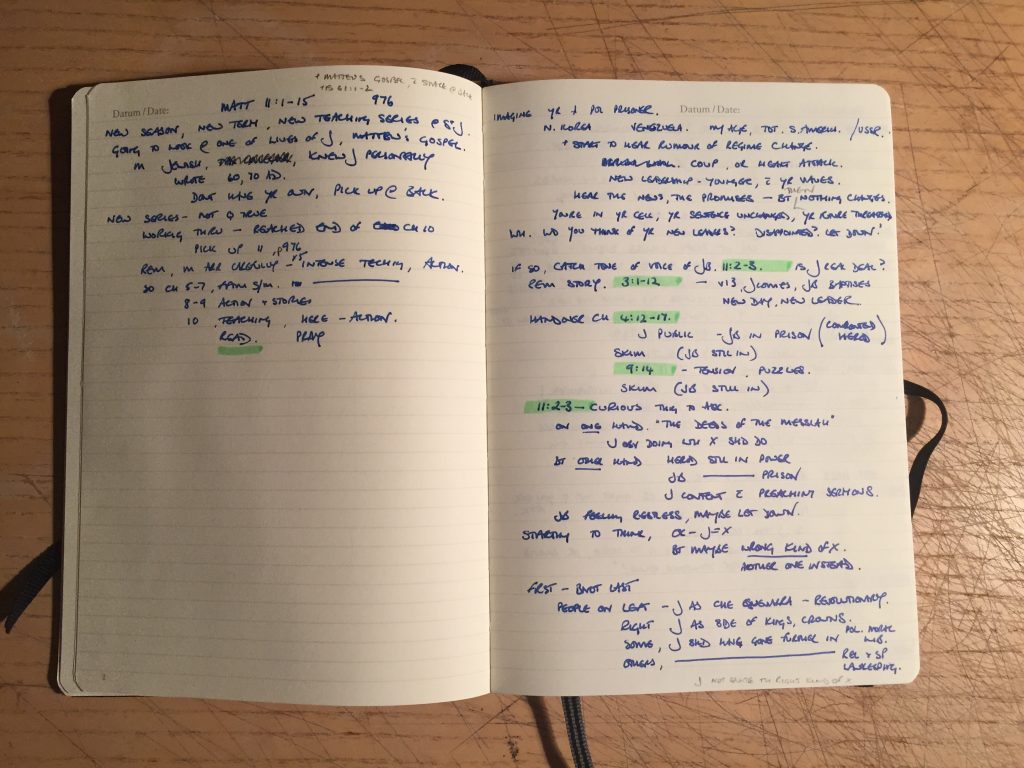
This is my most recent; dark blue or black ink for max visibility. A few months ago I made the rookie error of doing it pencil, and when I stood up in church I couldn’t read it! I ended up standing by the photocopier, running it through on the darkest setting to produce something legible.
My notes look pretty full, but I would be very familiar with them by the time I preach, and I feel quite free. I need the fuller format to take the guesswork out of my mind the third time around, though. It answers the question, ‘Have I told that story already?’ The highlighter is for when I want to read from the bible, so I can find my place again. If you can see pencil, it’s what was edited between the services.
What is your routine before preaching on a Sunday?
Ideally, I’m up with enough time for a decent Quiet Time, and to review the sermon. Team prayers at 8.25-40, then sorting out logistics, a quick clergy ‘pre-flight check’ at 9, after which I’m at the coffee point welcoming people till round about 9.29, for a 9.30 start. So until the service starts, it’s people, people, people.
Once the service has started, I’m focussing much more on the sermon. We’ll have around half an hour between the services, and I try to get away for about ten minutes to reset myself to do it again. A banana, some quiet, and I’m ready to do it again. I’m back home at around 1.30. The evening service has a similar pattern, and I’m on deck an hour before the service is due to begin.
What feedback structures do you utilise in improving on your preaching?
Clergy team meets on Monday, and we have a simple ‘What went well’ and ‘Even better if’ format. We sometimes read books together, to focus on particular areas, and currently we are looking at ‘Resonate’ by Nancy Duarte, to think about the shape of our sermons. This Christmas, I’m going to try giving the clergy team a sneak preview of the Carol service sermon, so I can get some hard feedback while there’s still time to change.
What areas are you currently seeking to develop in your preaching?
I’m always working at getting the text right, that is the one thing we must always be working at! Other than that, this year I have been through one of the CCEF Biblical Counselling modules, because I do find David Powlison, Ed Welch and Paul David Tripp enormously insightful on how the Bible changes us.
I have a little list of my preaching ‘heroes’, and continually select books that will make me more like one or other of them. And our team is thinking about the plot, or shape, of our sermons. Sermons are not just short lectures with a hymn at the end.
What do you do on the days your preaching did not go very well?
I never think it goes well!
I’m always aware of the choices I’ve had to make, the corners cut, and so forth. But after a while as a preacher you realise that the real task, which is raising the dead and making them Christlike, isn’t one you could do anyway. It’s not just difficult – it’s impossible for us. That’s God’s department, and we aren’t responsible for it. So we do our job, prayerfully and carefully, but know our place. John Chapman, the Australian evangelist, always used to ask himself, ‘Chappo, did you tell them about Jesus? Did you explain that from the Bible? Did you invite them to respond? Then go to bed.’ Wise advice. We do our work, and trust God to do the real work.
What one piece of advice would you pass on to someone starting out as a preacher?
Don’t get stuck in a groove! There are the obvious good, basic habits like careful text work, commentary work, and so on, and we should never move away from that. Stick at those for ever! But it’s so easy to become a deadly dull, one-note player, when there’s such a wide variety of models to learn from. Spend a year devouring everything from Lloyd Jones, until you’re inside his way of handling the task, and then switch to a John Ortberg or a Matt Chandler. Listen, don’t just read, and listen to how they do it, as well as what they’re saying. Analyse their game-plan and how they keep you attentive. Think about your work. Remain an apprentice, and take a different master each year.
What are some of the best resources you have found on preaching?
I have about a hundred books on preaching on my shelves, and I think I’ve learned something from almost all of them. Any of the books by the great ones (Stott, Spurgeon, Lloyd Jones, Keller) will be worth reading, by default. I was hugely impacted by Rick Warren about fifteen years ago, because of his commitment to simplicity and clarity. But the best resources will simply be the books by the best preachers, written at the peak of their ministries, reflecting on the task. Any book like that is worth paying careful attention to.
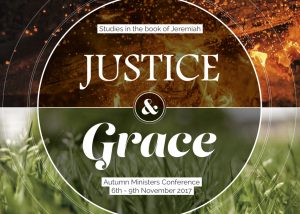
Chris Green is one of the speakers at our Autumn Ministers Conference 6th-9th of November. Chris will be helping us in preaching the book of Jeremiah.
